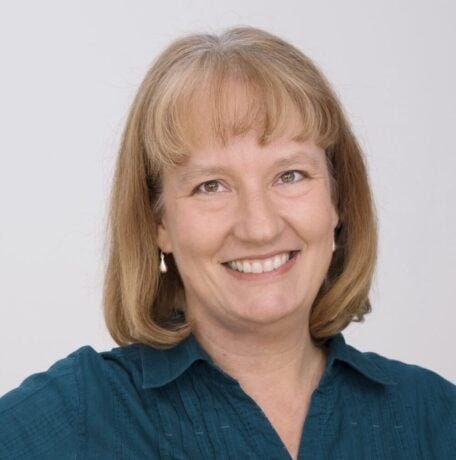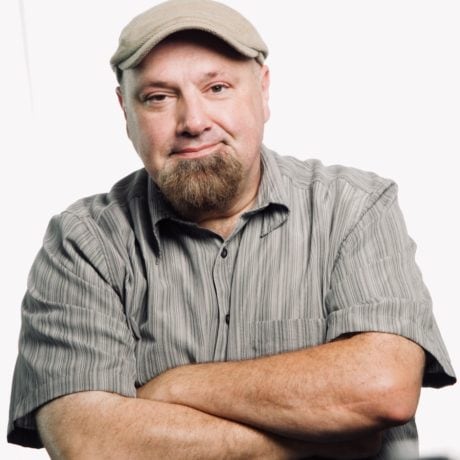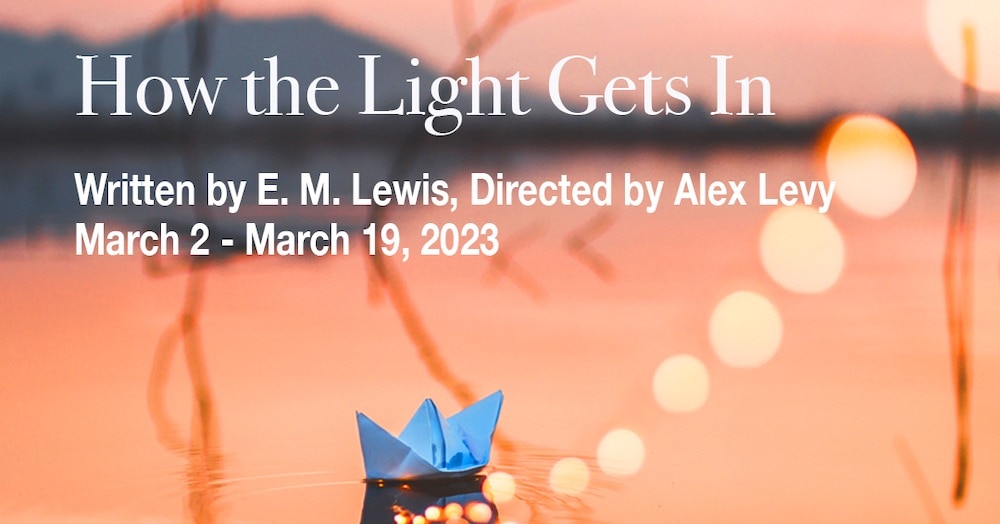By Bob Bartlett
A few summers ago, I was fortunate to take a workshop led by E.M. Lewis at the Kennedy Center. After meeting her, and hearing about her work, I rushed off to read a couple of her plays and then drove to New York to see her remarkable play The Gun Show. Since then, we’ve become colleagues and good friends, and sometimes writing buddies — she let me drag her into a zany, Zoom two-hander web series, Duck Harbor, which 1st Stage ran for a few months in the second summer of COVID, and which we wrote together each week for a live weekly performance without rehearsal. So it’s no surprise that I’ve been beyond excited to see one of her latest plays, How the Light Gets In, a beautiful story about a travel writer who never travels and which opens this weekend at 1st Stage.
I had the chance to chat this week with Ellen about her play. Like most writers, I’m always curious about another writer’s process — and how storytelling for the stage happens — and especially the process of a friend.
So, Ellen. Welcome back to Virginia and the DC area for the opening weekend of How the Light Gets In. I’m curious about the play’s origins. How did it begin?
Well, to be honest, I was going through some stuff. Six years ago, I received a rather brutal and absolutely unexpected medical diagnosis. And somewhere between doctors’ appointments and surgeries and radiation treatments, these characters arrived in my head to keep me company. I was really grateful for them because being sick is kind of a lonely business. And scary. And overwhelming. I was trying to walk every day during radiation, up and down this beautiful hill near where I live in Oregon, and I remember having to pause to scribble little bits of dialogue onto the paper in my pocket, as the characters started talking to me, and to each other.

Did the play come easily?
It came quickly, which isn’t exactly the same thing. I think I had a messy draft in about six months, and I had a reading of that draft in Portland’s Fertile Ground Festival. I developed it further with the wonderful folks at Boston Court Pasadena, in California. It was part of their new play festival, and then we took it out to Chautauqua in New York, and then it had its world premiere there in 2019. Through all of that time, I was writing and rewriting. All the way through previews, we were making changes. Finding things! The play went on to win the Steinberg New Play Award from the American Theatre Critics Association, and to be published by Samuel French.
Why did you need to write this story?
When I teach playwriting — which I do sometimes — I tell my students that plays are made out of playwrights. We put everything we are into our stories — our fears and desires, the things we value, the things that make us laugh, our big questions about the universe… all kinds of things! I was kind of in pieces when I started writing this story, and the process of writing it helped knit me back together again.
Are you in any of the characters in the play? (You don’t have to answer this one. Really.)
There are parts of me in all of these characters. I imagine it would be easy for folks to assume that I’m Grace, but that’s not really how it works for me when I write. We have things in common, but she’s her own person. And I have some pretty fundamental things in common with Haruki, too — even though you might not guess it, looking at me! I love all four of these characters very much, and I’m glad they find each other over the course of the play. I’m glad they have each other.
Your play’s title, of course, is from Leonard Cohen’s song “Anthem.” (I bought the album [The Future] on the day it was released in 1992!) Has the song — and the lyric — been with you long? Which came first for you: the song or your story? At what point in your process did the title come?
I love Leonard Cohen! There is something about his songs that gives equal time to the sacred and the profane, the body and the soul, that brings me back to them again and again. (I’ve actually named three or four characters in different plays Leonard! Ha!). I love his “Hallelujah,” of course, and the “Famous Blue Raincoat” song that’s a letter. “Chelsea Hotel #2” is my favorite! But that line from “Anthem” rang in my head like a bell at some point, early on, when I was working on this.
Ring the bells that still can ringForget your perfect offeringThere is a crack, a crack in everythingThat’s how the light gets in
I knew that was my title. I usually find my titles pretty early in the writing process, and they rarely change.
This isn’t the first time your work has been produced by 1st Stage. How did you and Alex Levy, the director of How the Light Gets In and the artistic director at 1st Stage, meet? What’s it like to work with a director who knows you and your work so well?
Alex and I have known each other quite a few years now! We met right around the time he became artistic director at 1st Stage. I can’t remember exactly who introduced us. I do remember a wonderful first conversation with him in the DC train station. We worked intensely together on the premiere of my play Now Comes the Night, which he directed as part of the DC Women’s Voices Theater Festival. It’s a very intense piece about war and friendship and guilt and ghosts. I think that bonded us! And then he brought in our Portland production of The Gun Show to the Logan Festival. And then, he worked with you and me to create our web series Duck Harbor! I love working with Alex. He gets my characters. We both have a deep love for theater magic. He’s so smart, but also has guts and heart. I have a few directors now, at this point in my career, who I’ve gotten to work with on multiple projects, over years of friendship and hard work and trust-building and storytelling. It’s a great gift. I’m a grateful playwright!
Because this isn’t the play’s first production — and you live on the west coast — I imagine that you haven’t had much interaction with Alex, the cast, and the designers. How do you prepare yourself for walking into a theater and seeing a story, and the humans and the world that you’ve imagined/created, built without you?
Alex invited me to Zoom into the first rehearsal, so I got to see the actors and some of the design presentations. But you’re right that this second production has been built mostly without me. Or I guess it’s more accurate to say, with only what I offered them on the page. I’m feeling all the emotions, as I fly east to see what they’ve done with my story! And part of that is because there really is some personal stuff woven into it, some of my own darkness and struggle to find the light. It’s a lucky playwright who has the opportunity to see her work go out into the world without her, and find new homes on farther stages! And I have a deep trust in Alex Levy. This is the fourth time we’ve had the opportunity to work together! I feel like he’s a kindred spirit, a bold and big-hearted director, and a good new play guy. I’m glad that it’s him who is taking on the second production of this play.
The story you tell in the play is powerful and so, so lovely. I haven’t seen the production yet (I’m bringing a group of my students this weekend!), but I cried reading the play. What do you hope the audience will feel as they leave the theater?
Thank you for that! What do I hope the audience will feel as they leave the theater? Well, during the last few years, particularly, there have been a lot of losses in our communities, a lot of fractures and breaks, a lot of isolation. It’s been a lonely and bewildering time. I once heard Edward Albee say [quoting the phrase] that plays should “afflict the comfortable or comfort the afflicted.” I hope that folks walk out of the theater after seeing this play feeling more brave in themselves, more connected to each other, and full of joy. This is a love story, after all! Whatever challenges the characters face along the way, it ought to end in joy.
_____

Bob Bartlett is a playwright and a theater professor at Bowie State University in Maryland. His plays include Union, a new play about Walt Whitman’s years living and loving in Washington, DC, during the Civil War; The Regular (2022 O’Neill Finalist; 2020 Seven Devils Playwrights Conference); E2, an adaptation of Christopher Marlowe’s Edward II, which recently premiered at Maryland’s Rep Stage; Swimming with Whales (1st Stage); happiness (and other reasons to die) (The Welders); and The Accident Bear (The Avenue Laundromat). His horror play, Lýkos Ánthrōpos, recently premiered in a wooded clearing in Central Maryland, and his latest really smart rom-com, Love and Vinyl, premieres later this spring at KA-CHUNK!! Records in downtown Annapolis. (bob-bartlett.com)
How the Light Gets In plays through March 19, 2023 (Thursdays at 7:30 pm, Fridays at 8 pm, Saturdays at 2 pm and 8 pm, and Sundays at 2 pm), at 1st Stage, 1524 Spring Hill Road, Tysons, VA. To purchase tickets ($15, student, military, educators; $47, seniors; $50, general admission; $35, Thursday evening), go online or call 703-854-1856. The first 20 tickets for each performance are only $20. Plus, a YES pass for high school students in Fairfax County offers free subscriptions. See details here.
Captions and audio description will be offered for select performances. Check 1stStage.org for the schedule.
COVID Safety: All patrons, volunteers, and staff are required to be masked while inside the 1st Stage Theatre facility. See 1st Stage’s complete COVID Safety Information here.
_____
SEE ALSO:
‘Duck Harbor’ from 1st Stage is a thrilling livestream ride (review of all 12 episodes by Debbie Minter Jackson, concluding August 18, 2021)
The Women’s Voices Theater Festival: ‘Now Comes the Night’ at 1st Stage (review by Samantha Macher, September 21, 2015)
‘The Gun Show’ at 1st Stage (review by John Stoltenberg, July 16, 2017)





